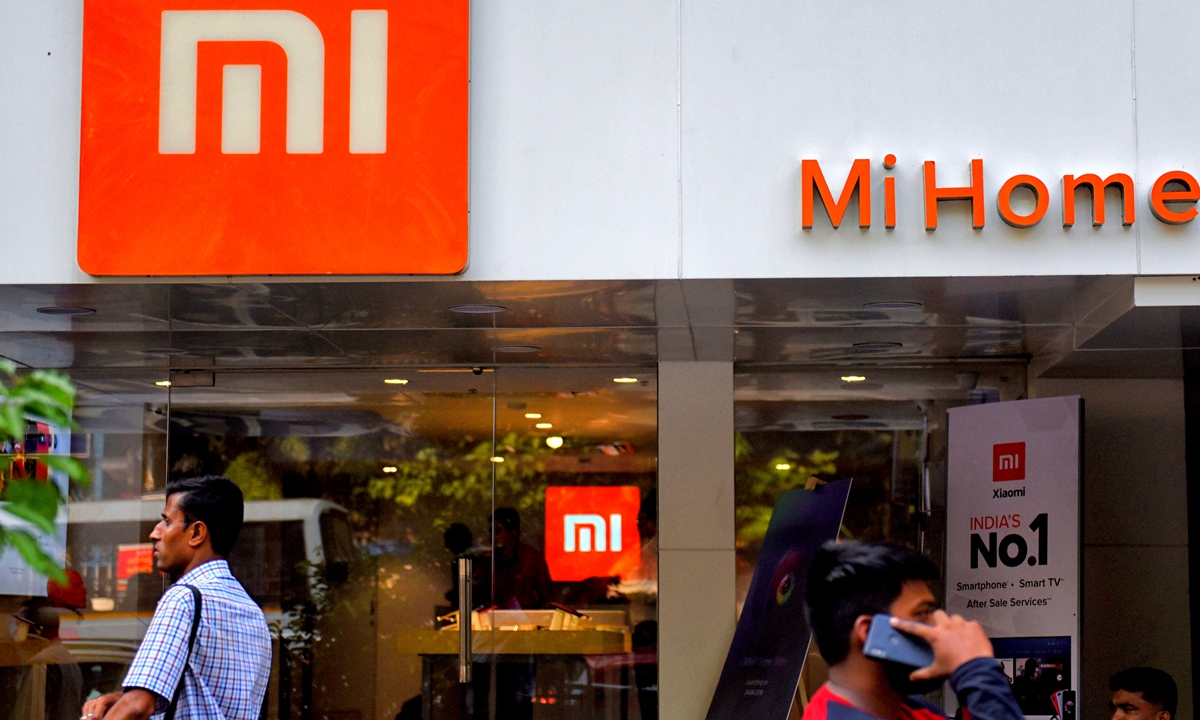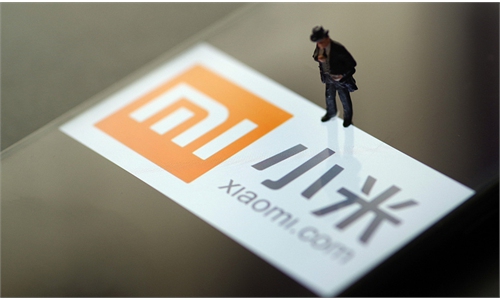India's 'unjustifiable' suppression of Chinese firms disguises political-motivated purpose, shatters foreign investors' confidence: experts

Pedestrians walk past a MI home mobile store in India, on April 22, 2019. Photo: VCG
Xiaomi India reportedly has been caught up in a round of significant layoffs. Recent media reports suggest that the company which employed an estimate of 1,400 to 1,500 employees at the beginning of 2023, has downsized its workface to approximately 1,000, and there are indications of further cuts occurring in the coming months.
This news sheds light on the challenges Chinese companies face in conducting business operations in India, which likely stem from the Indian government's recent intensification of moves targeting Chinese enterprises, experts said.
In response to the news, Xiaomi India issued a statement to yicai.com, stating that similar to any other company, the company's employee count is determined by market conditions and business projections. The company said that it does not dismiss the possibility of making necessary adjustments to optimize their workforce in cases where employees do not meet the required criteria.
The Indian government recently has frozen approximately 4.8 billion yuan-worth of Xiaomi's funds, citing alleged illegal transfer of funds overseas, raising questions about the potential impact of this incident on the sudden layoffs.
India's recent intensified scrutiny of Chinese enterprises has gone as far as interference in the appointment of senior executives in Chinese companies. According to the Indian media outlet the Economic Times, the Indian government has once again demanded that Chinese smartphone brands such as Xiaomi, OPPO, vivo, Realme, and others appoint Indian nationals to positions such as CEO, chief operations officer, chief financial officer, and chief technology officer.
Moreover, such interference extends beyond the mobile phone industry to other Chinese-invested manufacturing sectors. On Friday, the Indian Ministry of Commerce and Industry announced the launch of an anti-dumping investigation into aluminum frames for solar panels or modules originating in or imported from China.
This move indicates that the pressure on Chinese companies by Indian authorities has reached an "intense" stage, raising concerns among industry insiders, experts said.
Political-driven moves
Compared to other foreign investments, India has significantly intensified its efforts, which could only be described as bullying, against Chinese companies in the last two years, particularly after the border standoff between China and India in the Galwan Valley in June 2020. These actions are unjustifiable, said Liu Zongyi, secretary-general of the Research Center for China-South Asia Cooperation at the Shanghai Institutes for International Studies, in an interview with the Global Times.
According to Liu, the Galwan Valley clash may have just been a pretext for India's suppression on Chinese companies, and the actual purpose behind it was to expedite the development of India's domestic manufacturing capabilities. He noted that currently, India is far from achieving the self-reliance promised by Prime Minister Narendra Modi.
Data from the World Bank shows that the annual growth rate of India's manufacturing sector was relatively modest between 2014 and 2021. With the exception of 2015 when it exceeded 12 percent, the growth rate remained below 10 percent in previous and subsequent years. Meanwhile, the share of manufacturing in GDP reached 16 percent in 2015 but had been declining since, with data for 2021 showing a rate of14 percent.Based on these figures alone, it is difficult to argue that India has come close to achieving its established goal of "Make in India," Liu said.
Chinese manufacturers have played a significant role in cultivating a large pool of skilled workers in the Indian market. In addition to the workforce, these companies, ranging from mobile phone to photovoltaic and other manufacturing industry players, have made substantial investments in production equipment and assembly lines, making their own contributions to the modernization of India's manufacturing industry.
Taking Xiaomi as an example, the company has consistently focused on localizing production and has achieved significant success since its entry into the Indian market in 2014.
From 2015 to 2021, Xiaomi made substantial investments in India, establishing manufacturing facilities and enhancing the Indian supply chain. It has set up as many as seven production lines in India and employed over 20,000 Indian workers, effectively operating in a localized manner, according to media reports.
Liu said that India may feel that the conditions are ripe now, and may want to expand its own manufacturing industry on the basis of the existing ones by "means of extortion."
Xiaomi is not the only company that has been hit by Indian government's intensified moves. Other giants such as Amazon, Google, Samsung, OPPO, and vivo have also experienced market upheavals.
Multinational companies operating in India often face cumbersome procedures such as retrospective taxation and asset freezes. The Indian government also frequently conducts surprise inspections on these companies, citing reasons such as preventing tax evasion or penalizing non-compliance.
The magnitude of fines imposed during these inspections can be staggering.
Self-shooting game
Under the increased pressure on foreign investments in India, there has been a notable shift in the investment trend of Chinese companies in India. In terms of overall figures, Chinese investment in India witnessed a sharp decline in 2020 and 2021, with a compounded annual growth rate decrease of 66 percent compared to previous years.
The targeted measures by Indian authorities against Chinese companies have not only affected Chinese investors but also potentially undermined the confidence of foreign investors in general, with many companies having chosen to exit the Indian market amid growing concerns about their future business prospects.
Between 2017 and 2022, a total of 3,552 foreign companies and subsidiaries of foreign companies have been closed in India, data from the Indian government shows, as reported by the Business Standard.
Moreover, in the face of market uncertainties and other factors, the comprehensive market shares of Chinese smartphone manufacturers in India declined from a peak of over 81.42 percent to 70.83 percent in the first quarter of 2023, according to IDC data analyzed by DIGITIMES Asia.
For companies that prioritize scale, abandoning the Indian market is a challenging decision, an Indian-based industry insider told the Global Times on condition of anonymity, adding that with a population of over 1.4 billion, India presents a vast pool of cheap labor behind the demographic dividend.
However, the development and success of businesses in India require a market that is governed by a legal framework, institutionalized practices, and regulatory bodies that maintain consistency, the industry insider said, noting "clearly, in recent years, India's approach and attitude toward foreign investment have not been entirely satisfactory."
While the Chinese smartphone market share has experienced a slight decline, Indian smartphone brands have not benefited from this shift. The combined market share of Indian brands, including Lava, Micromax, and Reliance, has been less than one percent, industry data shows.
Qian Feng, director of the research department at the National Strategy Institute at Tsinghua University, told the Global Times that India's frequent actions against Chinese companies are driven primarily by political motives, with the aim of projecting a strong stance on China-related issues.
"But as two neighboring and large nations, cooperation between China and India is mutually beneficial for both countries' enterprises, advantageous for the modernization of India's industrial chain, and could inject new momentum into the advancement of Indian manufacturing," Qian said, urging the Indian government not to let political factors cloud their judgment and not to disregard their own interests and the wellbeing of their people.



